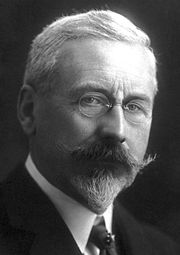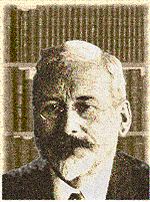Charles Édouard Guillaume
| Charles Édouard Guillaume | |
|---|---|
 |
|
| Born | 15 February 1861 Fleurier, Switzerland |
| Died | 13 May 1938 (aged 77) Sèvres, France |
| Nationality | Swiss |
| Fields | Physics |
| Institutions | Bureau International des Poids et Mesures, Sèvres |
| Alma mater | ETH Zurich |
| Known for | Invar and Elinvar |
| Notable awards | John Scott Medal (1914) Nobel Prize in Physics (1920) |
Charles Édouard Guillaume (15 February 1861, Fleurier, Switzerland – 13 May 1938, Sèvres, France) was a Swiss physicist who received the Nobel Prize in Physics in 1920 in recognition of the service he had rendered to precision measurements in physics by his discovery of anomalies in nickel steel alloys.
Guillaume is known for his discovery of nickel-steel alloys he named invar and elinvar. Invar has a near-zero coefficient of thermal expansion, making it useful in constructing precision instruments whose dimensions need to remain constant in spite of varying temperature. Elinvar has a near-zero thermal coefficient of the modulus of elasticity, making it useful in constructing instruments with springs that need to be unaffected by varying temperature, such as the marine chronometer. Elinvar is also non-magnetic, which is a secondary useful property for antimagnetic watches.
Guillaume worked with Kristian Birkeland. He served at the Observatoire de Paris—Section de Meudon. He conducted several experiments with thermostatic measurements at the observatory. He was the first to determine accurately the temperature of space.
Guillaume was married in 1888 to A.M. Taufflieb, with whom he had three children.
Publications

- Guillaume, Charles-Edouard (1896). "La Température de L'Espace (The Temperature of Space)". La Nature 24.
- Guillaume, Charles-Edouard (1886). Études thermométriques(Studies on Thermometry).
- Guillaume, Charles-Edouard (1889). Traité de thermométrie (Treatise on Thermometry).
- Guillaume, Charles-Edouard (1894). Unités et Étalons (Units and Standards).
- Guillaume, Charles-Edouard (1896). Les rayons X (X-Rays).
- Guillaume, Charles-Edouard (1898). Recherches sur le nickel et ses alliages (Investigations on Nickel and its Alloys).
- Guillaume, Charles-Edouard (1899). La vie de la matière (The Life of Matter).
- Guillaume, Charles-Edouard (1902). La Convention du Mètre et le Bureau international des Poids et Mesures (Metrical Convention and the International Bureau of Weights and Measures).
- Guillaume, Charles-Edouard (1904). Les applications des aciers au nickel (Applications of Nickel-Steels).
- Guillaume, Charles-Edouard (1907). Des états de la matière (States of Matter).
- Guillaume, Charles-Edouard (1907, 1913). Les récents progrès du système métrique (Recent progress in the Metric System).
- Guillaume, Charles-Edouard. Initiation à la Mécanique (Introduction to Mechanics).
References
- Nobel Lectures, Physics 1901-1921, " Charles-Edouard Guillaume – Biography". Elsevier Publishing Company, Amsterdam.
- lanl.gov, "History". Pioneers in the development of the Plasma Universe.
External links
|
||||||||||||||||||||